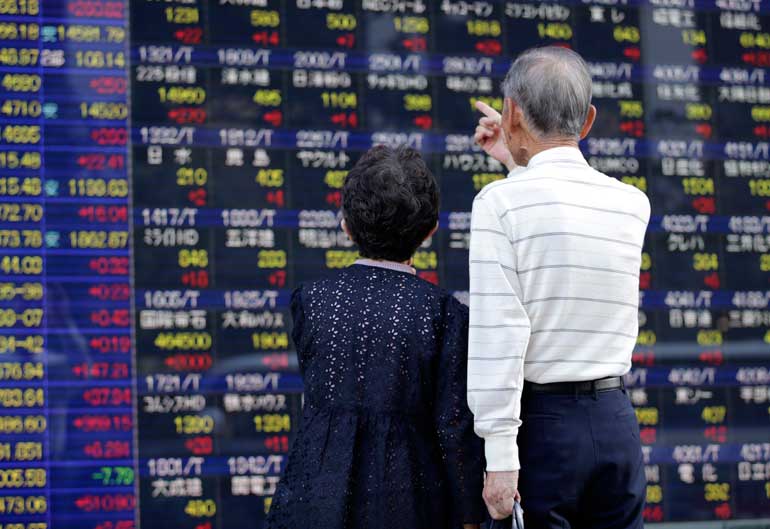Tuesday Feb 24, 2026
Tuesday Feb 24, 2026
Saturday, 19 September 2015 00:00 - - {{hitsCtrl.values.hits}}

Tokyo (Reuters): Asian shares rose on Friday on relief that the US Federal Reserve held off on raising interest rates but gains were capped by renewed concerns about the health of the global economy, in particular China.
European shares were expected to slip, however, with Germany’s DAX and France’s seen falling as much as 0.3%, tracking a reversal on Wall Street overnight.
The dollar was on the defensive, having fallen more than 1% after the Fed’s decision, while US bond yields plunged, erasing their sharp rises in the past couple of days.
MSCI’s broadest index of Asia-Pacific shares outside Japan rose 1% to a four-week high, led by financials in many markets.
But Japan’s Nikkei average fell 2%.
Traders in Tokyo said the Fed decision left investors with two conflicting interpretations: investors are concerned that the US economy is not growing strongly enough to withstand rate increases, but at the same time easy monetary conditions in the US may now continue for a longer period of time, which should support global equity markets.
Fed Chair Janet Yellen said the global outlook has appeared to become less certain, adding that recent falls in US stock prices and a rise in the value of the dollar already were tightening US financial market conditions.
Analysts and traders had been nearly evenly split on whether the Fed would raise rates for the first time in nearly a decade, though markets had priced in only a one-in-four chance of a hike.
The Fed’s fresh economic projections showed 13 of 17 policymakers still foresee at least one rate hike in 2015, down only slightly from 15 at the last forecast made in June. But it also trimmed its 2016 and 2017 economic growth forecasts.
Financial markets, which have constantly forecast a far slower pace of policy tightening than the Fed’s projections, were less convinced.
Instruments such as federal fund futures and overnight indexed swap are pricing in only about one in two chance of a rate hike by the end of year.
For the Fed to raise rates, Yellen said she wanted to see more improvement in the US labour market and expressed concern over weak inflation.
Yellen explicitly noted the Central Bank was focusing on the slowdown in China and emerging markets, saying one key issue is whether there might be a risk of a more abrupt slowdown in China.
“Yellen specifically mentioned China as a key influencer in their decision. This means China and its regulators are now in the driver’s seat and that isn’t a thought that brings down uncertainty - quite the contrary,” said Olivier d’Assier, Asia-Pacific managing director at risk management firm Axioma in Singapore. “(China’s Central Bank) is one of the least transparent regulators. Fed watching is a science now and people have been doing it for decades. It’s not the same in China. You can watch the PBOC but you won’t get any signal until they do something, and it might be something totally different,” he added.
A sudden devaluation of the yuan the People’s Bank of China’s last month shocked global markets and stoked worries that its economy may be in worse shape than previously thought.
“Going into the Fed’s meeting, there were three scenarios. A rate hike and dovish outlook, no hike with hawkish comments and a no hike with dovish comments. People seem to think the result was no hike and dovish comments. Despite that, risky assets had a tepid reaction,” said a currency trader at a Japanese bank.
“Looking at the way markets are reacting, risky assets could come under selling pressure again,” he added.
As the prospects of higher interest rates down the road had been a major attraction for the dollar, the US currency was wobbly against many other currencies.
The dollar index against a basket of major currencies was little changed at 94.574 on Friday, having fallen to a three-week low of 94.360 on Thursday.